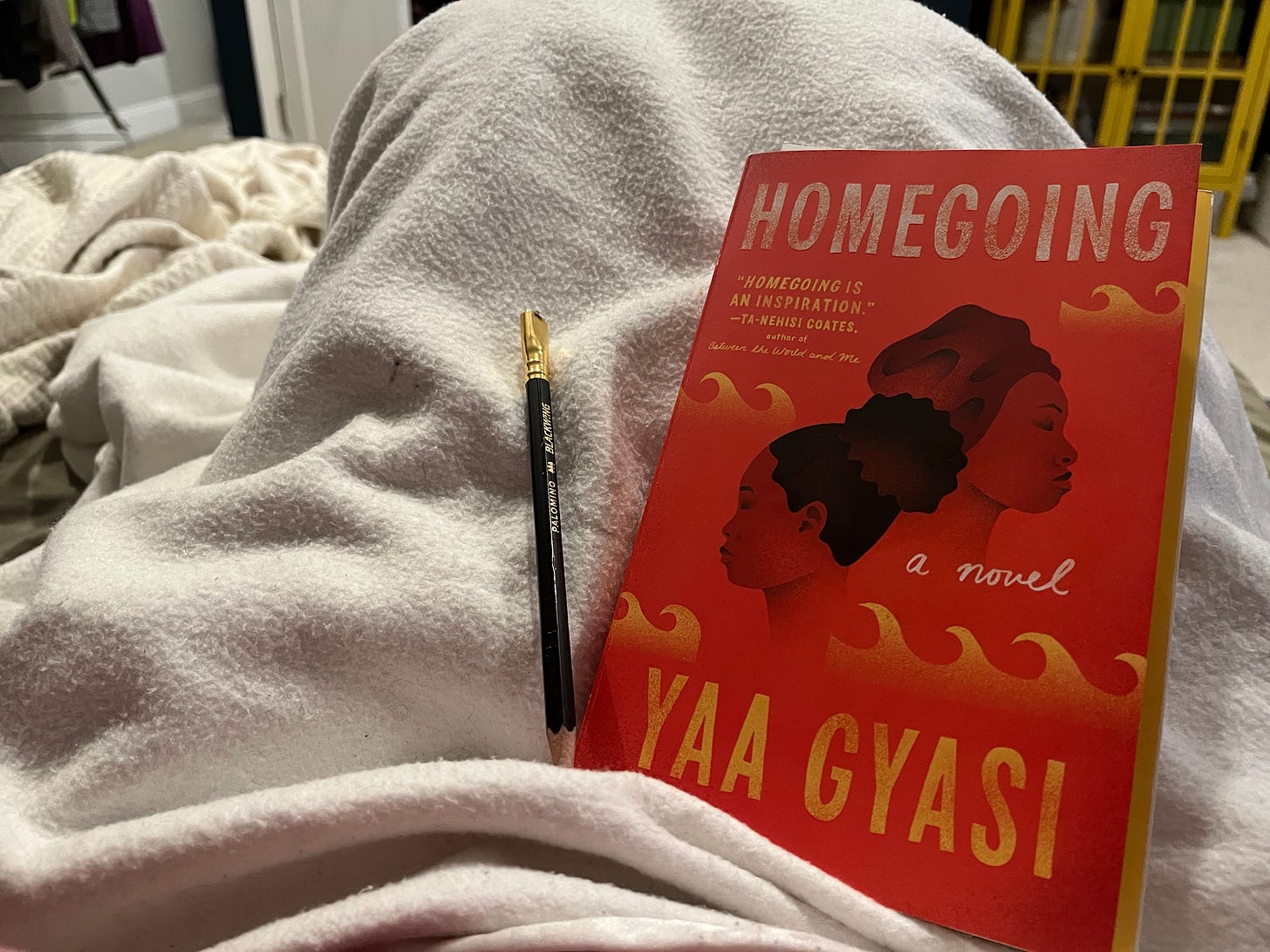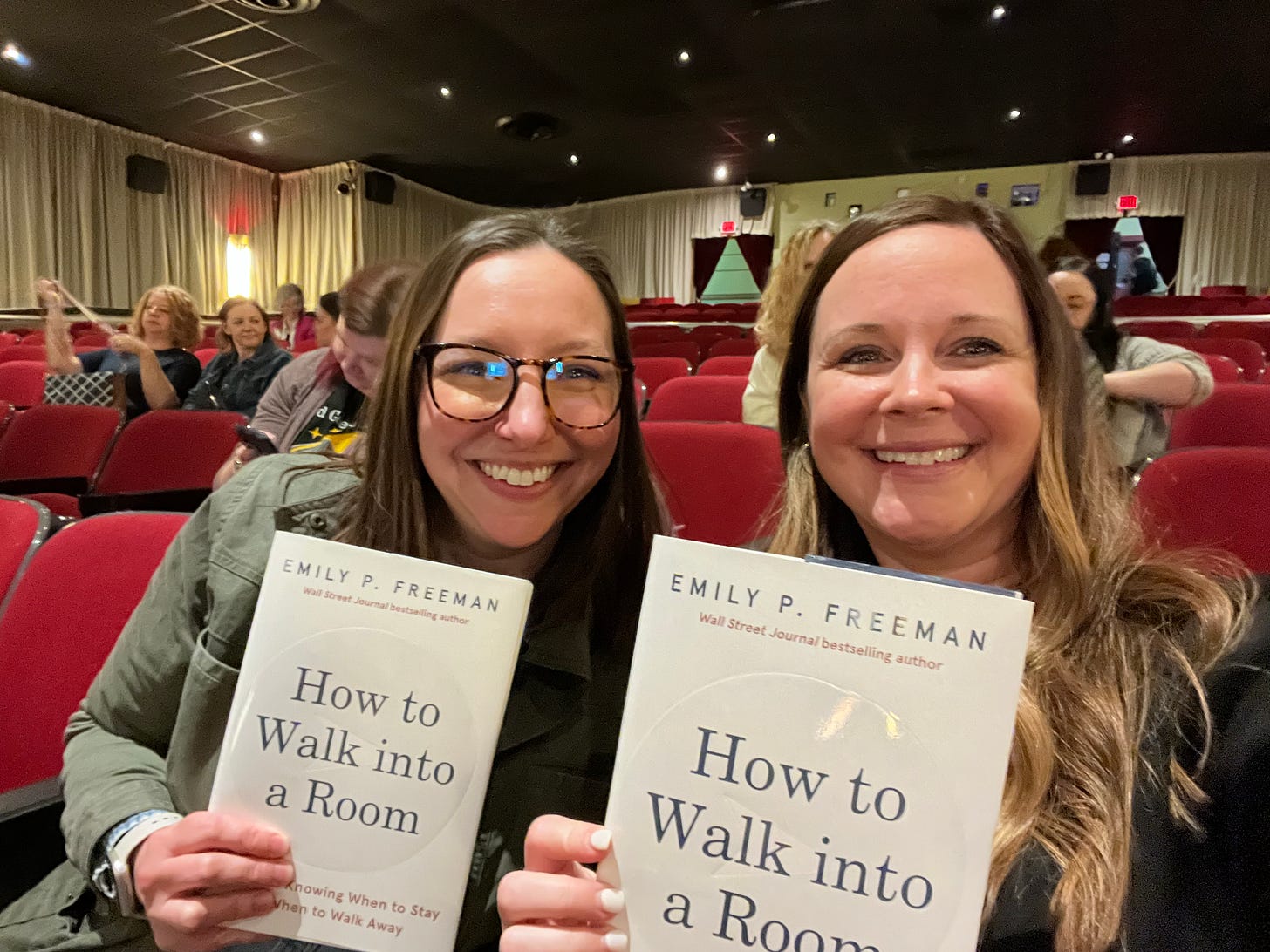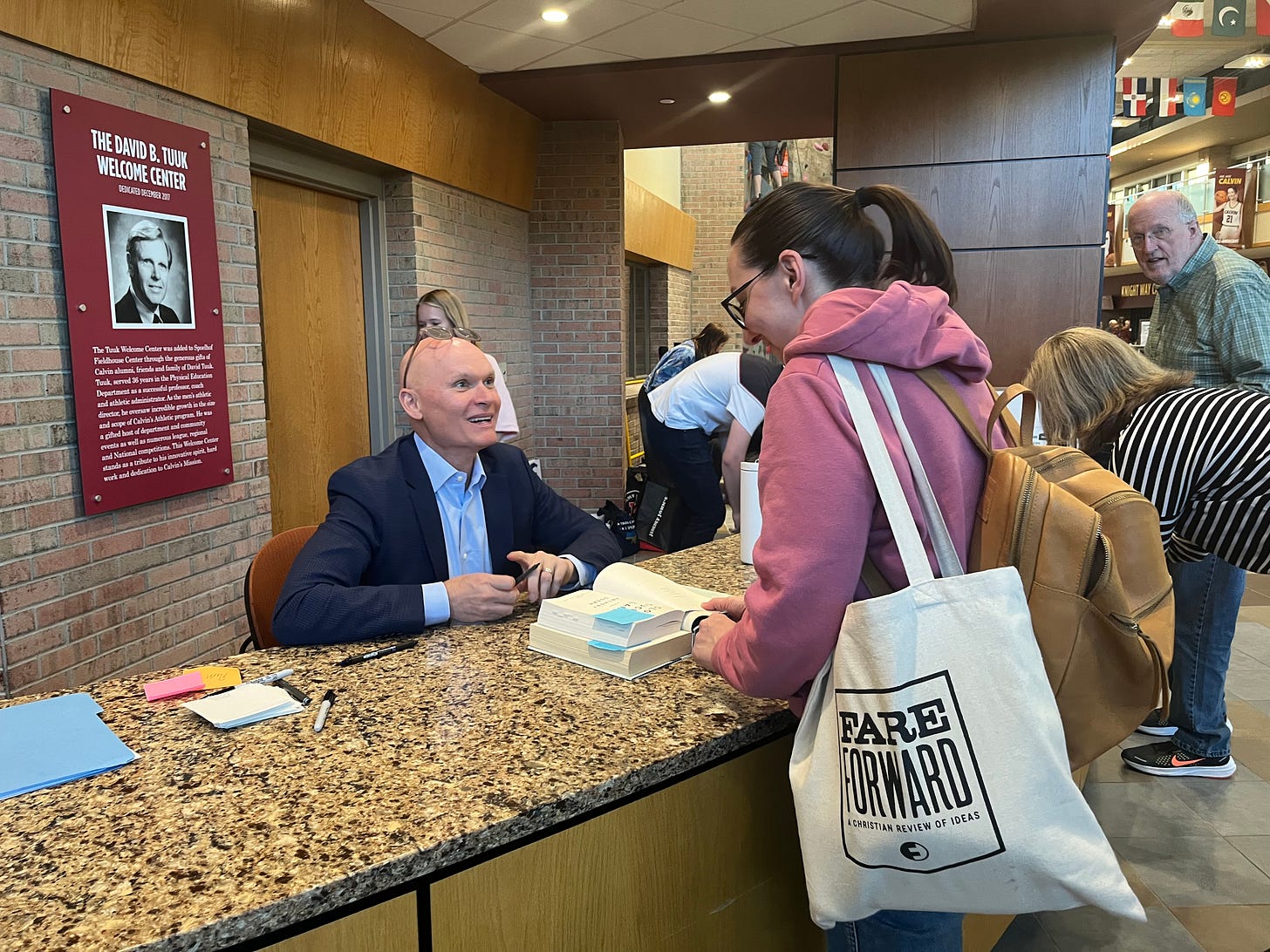Whoops, I forgot to share what I read in March, so you are getting a two-for-one deal today, friends. April was full of bookish goodness—I went with my friend Jessica to Wild Geese Bookshop to see Emily P. Freeman and Shannan Martin, and the following weekend was the Festival of Faith & Writing! (Hopefully you’re not sick of hearing me talk about FFW yet!)
I also want to let you know that I’m now participating in Bookshop.org’s affiliate program! That means that if you click one of my links and purchase a book from them, I’ll earn a small commission at no additional cost to you. This is a small way to monetarily support the writing I do, and I’m grateful to be able to do it!
Now, let’s dive in to recent reads. I’m saving the best for last today (so scroll down if you must)!
In March, I read…
Field Notes for the Wilderness by Sarah Bessey: I am Bessey completist, and count her books Jesus Feminist and Out of Sorts among the most impactful I’ve ever read. So, I was super grateful to receive a review copy from The Englewood Review of Books. You can read my full review of this book for the Englewood Review of books here.
The Wednesday Wars by Gary D. Schmidt: After finishing The Labors of Hercules Beal in February, I was eager for more Gary D. Schmidt. This started out slowly, but I was all-in by the end. Another hope-restoring, soul-buoying middle grade novel. (I also thought Schmidt would be at FFW, because he always is, but he wasn’t this year!)
On the Spectrum: Autism, Faith, and the Gifts of Neurodiversity by Daniel Bowman Jr.: This was pick to prep for FFW, as Daniel Bowman Jr. was one of the speakers. This is an interesting book, because it does not stick to one genre or format. Bowman talked about this at FFW and called it a “narrative collage,” which he described as a “distinctly autistic narrative form.” Bowman was is a poet and professor who was diagnosed with Autism as an adult, and he provides interesting perspectives about the challenges he’s faced and how he wishes Neurodiversity was treated in society.
This Here Flesh: Spirituality, Liberation, and the Stories That Make Us by Cole Arthur Riley: Five giant gold stars for this one. So rich, so full of depth and meaning, a much needed perspective in Christian circles. I started the audio but switched to print; Riley narrates it herself and I’m not sure that’s her strength. So, don’t let the audio experience detract from the beauty and value in this book.
Happiness Falls by Angie Kim: Happiness Falls was the March pick for Indianapolis Moms Books Club, and we had one of our best discussions, in part because we all had such diverse opinions about it. This book was compulsive, and I did not want to put it down, but it fell a little flat for me in the end. But one simple thing I learned that I can’t stop thinking about: There is a difference between non-verbal and non-speaking, and we’d do well to use our language carefully when discussing people who fall into one or both of those categories. (Don’t let anyone tell you fiction can’t teach you things.)
A Boy Called Bat by Elana K. Arnold: Another 5 star read—everyone in our family thoroughly enjoyed this book! We started this as a family read-aloud and finished it on audio during a road trip; both experiences were delightful. The protagonist of this book, Bat, is a boy with Autism. What makes this book so refreshing (and also SO NEEDED) is that the conflict in the story does not emerge from or have anything to do with Bat being Autistic—he just is. Ian quickly devoured the next two in the series. Highly recommend for your middle-grade readers or as a family read-aloud.
In April, I read…
To Free the Captives: A Plea for the American Soul by Tracy K. Smith: Smith was another keynote speaker at FFW. She is the former U.S. Poet Laureate, and this is her most recent work—a memoir. It was fascinating to read this book in conversation with Homegoing, because Smith is looking into her own ancestry and reflecting on the legacy of enslavement in our nation and in her family. I wish I had read this on print instead of audio.
I also read two of Smith’s poetry collections: Life on Mars and Wade in the Water: I read both of these in print, but with Smith’s voice in my head after listening to To Free the Captives on audio. Smith’s poetry is not my favorite, but the images she uses are so interesting. Wade in the Water is my favorite of her work that I read—especially because much of it is erasure poetry and other responses to primary sources from enslaved Americans and black Civil War soldiers, which I found really impactful.
You Bring the Distant Near by Mitali Perkins: Another FFW speaker! I had read some of Perkins’ picture books, but this was my first of her YA novels. I really enjoyed it! The audio has a lot of characters and several narrators, and sometimes I found the voices to be inconsistent (especially when switching between British and American accents), but it was still good. I think this would be a great read for the teenager girls in your life, especially those from immigrant and/or biracial families.
Touch the Earth: Poems on the Way by Drew Jackson: I loved Jackson’s first collection of poetry, so I was excited to read this one as well. Every poem is written in response to Scripture and explores faith, politics, and the African American experience. I would love to hear Jackson read these poems aloud, but I already owned a hard copy and sadly my library didn’t have the audio available.
One in a Millennial: On Friendship, Feelings, Fangirls, and Fitting In by Kate Kennedy: This was our April Indy Moms Book Club pick, and it was another really fun discussion. I think if you are a true millennial, you will love the nostalgia, humor, and familiarity here. Some of the women in our group were a little closer to 40 were not as into it, which makes senseof. But what Kate does here is expertly explore the frivolity and the significance of the trends, hobbies, and media of millennial childhoods and adolescence. As someone who often feels the whiplash of wanting to explore both serious and silly, deep and shallow, and wondering if there is room for both in my life, relationships, and work. Come for the boy band references, stay for the vulnerability.
Two 5-star, all-time favorites in March and April:
Homegoing by Yaa Gyasi: Wow, wow, wow. Homegoing is one of the best books I’ve ever read, and I’ve hardly stopped thinking about it since finishing. It’s been on my shelf for many years, but I finally prioritized it because Gyasi was one of the keynote speakers at FFW. Homegoing begins in 16th Century Ghana, where a woman gives birth to two daughters. One daughter marries a slave trader, and the other is sold into slavery. From there, the story moves back and forth between these two branches of the family tree, skipping ahead one generation at a time. This structure means the narrative moves from the 1500s to present day in a pretty slim volume; it’s actually a bit jarring to realize how few generations are required to move so far through time.
It took me a long time to finish, because the content is very difficult. Often, I would finish a chapter and set the book aside, not feeling ready to pick it up again for several days. By the time I hit the final quarter of the book, I could hardly put it down. I was captivated, and these characters may never leave me. Gyasi was able to articulate and illustrate the lasting effects of slavery and trauma in a way nothing else I’ve read ever has. I can’t recommend it highly enough, if you are able to stomach the many, many difficult and dark things that occur throughout the story.

Cloud Cuckoo Land by Anthony Doerr: Where do I even begin with talking about this book? Doerr was the closing speaker for FFW, and All the Light We Cannot See has long been my favorite book. I’ve put CCL off for so long, in part because I just didn’t see how it could ever, ever hold up to All the Light. This is a strange book; the jumps in time, place, perspective are unique and also huge. More than halfway through the book, I still couldn’t figure out how everything connected. I constantly asked myself, “Where is this heading?!” But the payoff! Wow. I want to read this book again one day, to study it closely and figure out how, exactly, Doerr managed to do it. Just like All the Light, I think this is a masterpiece. Not any easy read by any means, but so worth it. I have a story to tell about meeting Anthony Doerr in the book signing line and all this book really means to me—but that will have to come later, because I am still processing.
Well, folks, there you have it! Fourteen books in March and April, including 3 poetry collections and 8 from FFW authors. (But no romance! I will rectify that in May, fear you not. We have new Emily Henry to read!). This brings my total so far in 2024 to 30, which makes me so happy. Few things bring me as much joy as a stack of good books, especially when shared with other readers—and this spring has been an embarrassment of riches in that regard.
Please let me know in the comments what you’ve been reading lately!
Dog-ears and highlighters,
Lindsey





Yay, thanks for sharing all of these -- adding several to my TBR :) Also, the FFW sounds amazing . . . going to Google right 🫶🏻